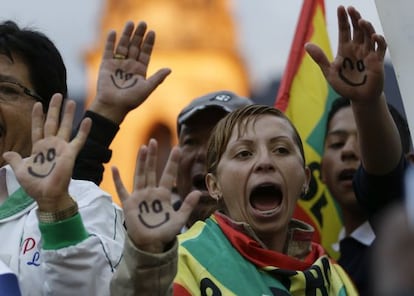Santos approves firing of popular Bogota mayor despite international appeals
Former guerrilla says that he will continue the fight to keep his job

Despite a plea from a regional human rights panel, Colombian President Juan Manuel Santos signed a decree late Wednesday officially firing the leftist mayor of Bogota, Gustavo Petro, who had been waging an international campaign alleging he was a victim of political persecution.
Petro, whose term would have ended in December 2015, held the second most popular political post in the country. Santos appointed his labor minister, Rafael Pardo Rueda, as acting mayor until elections can be held in the Colombian capital.
The former M-19 guerrilla, who was swept into office with a high percentage of votes in 2011, was suspended on December 9 after the country’s inspector general ruled that he violated free market reforms by canceling a string of city garbage pickup contracts in 2012. He was also banned from holding any elected office for 15 years.
Petro had taken his fight to the Inter-American Court of Human Rights (IACHR) in Costa Rica which – just 20 hours before Santos’ decision – asked the Colombian government for “cautionary measures” and set aside the suspension.
But Santos explained that one of the reasons on which he based his decision was the fact that Petro was afforded adequate legal assistance paid by the state to defend himself.
“Since the inspector general announced the suspension of the mayor of Bogota, Gustavo Petro, we clearly and firmly pointed out that the president and the government will respect the Constitution and laws, and defend the institutions,” Santos said during remarks made at the Naranjo presidential palace. “At the same time, we asked that Mayor Petro’s rights must also be respected and he should be allowed to use all the legal recourses that are at his disposal.”
After the president’s announcement, Petro said he would “exhaust” all legal recourses on an international level.
Petro had argued that the inspector general’s decision infringed on Colombians’ voting rights
Foreign Minister María Ángela Holguín explained that the IACHR’s call for cautionary measures is not binding to Colombia.
But some analysts believed that if Santos had accepted the regional court’s petition, he would have had to follow suit with scores of mayors and governors who have been sanctioned by the country’s powerful inspector general, Alejandro Ordóñez, sparking institutional chaos.
Still, it was a difficult decision for Santos, who ended up sacking one of the country’s most popular politicians. The Colombian president had consulted with his advisors and the IACHR. More than 300 petitions for injunctions in Petro’s favor were filed in different courts by the now-former mayor and his followers, which allowed him to continue in office for four months after Ordóñez’s decision.
But the State Council, which acts as an advisory panel for the president, ruled that the people’s voting rights cannot override the inspector general’s duties to investigate and sanction elected officials.
Petro had argued that Ordóñez’s decision infringed on Colombians’ voting rights.
The former guerrilla, one of the leaders of the M-19 Movement, laid down his arms during the peace process that took place during President Virgilio Barco’s term in office, from 1986 to 1990. In 1991, Petro participated in Colombia’s Constituent Assembly with other demobilized guerrillas and representatives of political parties and social movements across the country.
After serving in Congress and in the Senate, Petro was elected mayor in 2011 by more than 700,000 votes. His decision to cancel the city garbage contracts – a move that eventually cost him his job – led to trash piling up throughout the city.







































